Peer-reviewed journal articles
Publication Types:
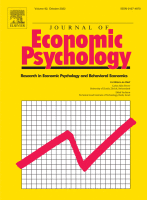
The economic crisis during the COVID-19 pandemic has a negative effect on tax compliance: Results from a scenario study in Austria
In a scenario study with 1200 Austrian taxpayers, we examined how tax compliance is affected by the economic crisis related to the COVID-19 pandemic. Moreover, we investigated the potential of
trust in government, attitude towards taxes, and justice perceptions in mitigating potential effects. The results suggest a strong effect of the economic environment on tax compliance. Specifically, tax compliance was lower in scenarios where the pandemic had a negative effect on the economy than in scenarios with no negative effect. However, for individuals with a positive attitude towards taxes, compliance was not lower in a negative economic environment than in pre-COVID-19 times. Moreover, we found that taxpayers who were not affected economically, taxpayers with a positive attitude towards taxes, and taxpayers with a low propensity to take risks generally indicated higher levels of tax compliance. Exploratory analyses indicate that taxpayers who change their compliance behavior in response to the economic environment are, on average, younger, less educated, more strongly affected economically, and more uncertain about their current economic situation than taxpayers with stable compliance levels. Policy interventions should target these groups to strengthen tax compliance in times of crisis.
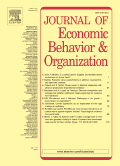
Information defaults in repeated public good provision
We study an unexplored type of defaults – information defaults – in a repeated public good provision setting. In our treatments, we vary the default of having or not having contribution information as well as whether the information comes with a positive, zero or negative financial incentive. We find that almost all subjects have the information when this is cost-free or financially beneficial, but around a third have the information even when this is costly. Moreover, a default of not having information leads to a slower unraveling of cooperation which is matched by the beliefs about others’ contributions in these treatments. We also find a secondary informational default effect, challenging previous findings on how defaults work: when the default is no information, subjects do not seek information more often, but they tend to believe that more other subjects seek information.
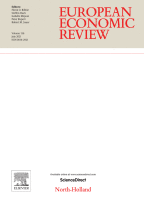
Disincentives from redistribution: evidence on a dividend of democracy

Personal accountability and cooperation in teams
In a real effort lab and online team production experiment, we analyze exerted effort under different conditions of individual accountability. In a repeated setting, we vary the degree to which production can be directly traced back to a collaborator’s individual or randomly drawn effort level, respectively. We find that individuals produce much less and the decline of effort over time is significantly steeper under high as compared to low and endogenously chosen personal accountability. While endogenous accountability provides an option for monitoring others, it does not force subjects to learn about their under-performing peers, thus limiting the typical decline of contributions over time. We conclude that accountability one step removed may be an interesting institutional setting for repeated collaborations in contexts where low accountability for political, social or legal reasons is not a viable option.
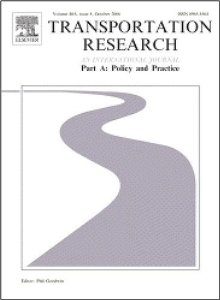
Estimating the price elasticity of fuel demand with stated preferences derived from a situational approach
An evidence-based policy debate about future fuel demand requires reliable estimates for fuel price elasticities. Such predictions are often based on revealed preference (RP) data. However, this procedure will only yield reliable results in the absence of severe structural discontinuities. In order to overcome this potential limitation we used a situational stated preference (SP) survey to estimate the response to hypothetical fuel price changes beyond the scope of previous observations. We elicit fuel price elasticities for price increases up to four Euros per liter and find that the situational approach predicts the actual responses to previously observed fuel price changes very well. We conclude that applying a situational approach is particularly useful, if behavioral predictions for unprecedented (non-monetary) policy interventions or supply side shocks are of interest that go beyond the reach of standard RP approaches.
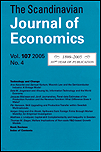
Contract Choice: Efficiency and Fairness in Revenue Sharing Contracts
We present a simple principal-agent experiment in which the principals are allowed to choose between a revenue sharing, a bonus and a trust contract, to offer to an agent. Our findings suggest that a large majority of experimental subjects choose the revenue sharing contract. This choice not only turns out to be the most efficient but at the same time is fair. Overall, the distribution of earnings is only mildly skewed towards the principal. We conclude that under revenue sharing contracts concerns for fairness can go in hand with the use of monetary incentives.

Search costs and adaptive consumers: Short time delays do not affect choice quality
Using online price comparison and shopping platforms makes experiencing slow connections, lags and waiting times for information an unfortunate reality. However, little attention has been paid to analyzing the effects of such delayed display of information on product choice behavior. This article explores the effect of time delays in a multi-attribute choice laboratory experiment by not providing information immediately when requested but after short time delays. Increasing these waiting times reduced the amount of information looked-up but did not affect choice quality. Higher time delays made decision-makers use more deliberate search processes, whereas low time delays induced inefficient oversearching.
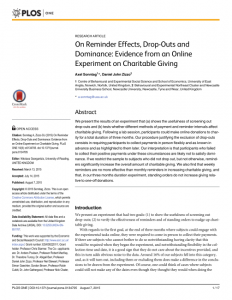
On Reminder Effects, Drop-Outs and Dominance: Evidence from an Online Experiment on Charitable Giving
We present the results of an experiment that (a) shows the usefulness of screening out drop-outs and (b) tests whether different methods of payment and reminder intervals affect charitable giving. Following a lab session, participants could make online donations to charity for a total duration of three months. Our procedure justifying the exclusion of drop-outs consists in requiring participants to collect payments in person flexibly and as known in advance and as highlighted to them later. Our interpretation is that participants who failed to collect their positive payments under these circumstances are likely not to satisfy dominance. If we restrict the sample to subjects who did not drop out, but not otherwise, reminders significantly increase the overall amount of charitable giving. We also find that weekly reminders are no more effective than monthly reminders in increasing charitable giving, and that, in our three months duration experiment, standing orders do not increase giving relative to one-off donations.
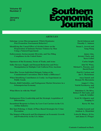
Institutional Authority and Collusion
A “collusion puzzle” exists by which, even though increasing the number of firms reduces the ability to tacitly collude, and leads to a collapse in collusion in experimental markets with three or more firms, in natural markets there are such numbers of firms colluding successfully. We present an experiment showing that, if managers are deferential toward an authority, firms can induce more collusion by delegating production decisions to middle managers and providing suitable informal nudges. This holds not only with two but also with four firms. We are also able to distinguish compliance effects from coordination effects.
